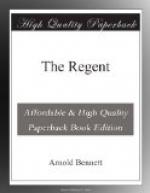Edward Henry breathed to himself, “This is the genuine article.”
And, being an Englishman, he was far more impressed by Mr. Wrissell than he had been by the much vaster reputations of Rose Euclid, Seven Sachs and Mr. Slosson, senior. At the same time he inwardly fought against Mr. Wrissell’s silent and unconscious dominion over him, and all the defiant Midland belief that one body is as good as anybody else surged up in him—but stopped at his lips.
“Please don’t rise,” Mr. Wrissell entreated, waving both hands. “I’m very sorry to hear of this unhappy complication,” he went on to Edward Henry, with the most adorable and winning politeness. “It pains me.” (His martyred expression said, “And really I ought not to be pained!”) “I’m quite convinced that you are here in absolute good faith—the most absolute good faith—Mr.—”
“Machin,” suggested Mr. Slosson.
“Ah! pardon me! Mr. Machin. And naturally in the management of enormous estates such as Lord Woldo’s little difficulties are apt to occur.... I’m sorry you’ve been put in a false position. You have all my sympathies. But of course you understand that in this particular case ... I myself have taken up the lease from the estate. I happen to be interested in a great movement. The plans of my church have been passed by the County Council. Building operations have indeed begun.”
“Oh! chuck it!” said Edward Henry, inexcusably—but such were his words. A surfeit of Mr. Wrissell’s calm egotism and accent and fatigued harmonious gestures drove him to commit this outrage upon the very fabric of civilization.
Mr. Wrissell, if he had ever met with the phrase—which is doubtful—had certainly never heard it addressed to himself; conceivably he might have once come across it in turning over the pages of a slang dictionary. A tragic expression traversed his bewildered features—and then he recovered himself somewhat.
“I—”
“Go and bury yourself!” said Edward Henry, with increased savagery.
Mr. Wrissell, having comprehended, went. He really did go. He could not tolerate scenes, and his glance showed that any forcible derangement of his habit of existing smoothly would nakedly disclose the unyielding adamantine selfishness that was the basis of the Wrissell philosophy. His glance was at least harsh and bitter. He went in silence, and rapidly. Mr. Slosson, senior, followed him at a great pace.
Edward Henry was angry. Strange though it may seem, the chief cause of his anger was the fact that his own manners and breeding were lower, coarser, clumsier, more brutal than Mr. Wrissell’s.
After what appeared to be a considerable absence Mr. Slosson, senior, returned into the room. Edward Henry, steeped in peculiar meditations, was repeating:
“So this is Slosson’s!”
“What’s that?” demanded Mr. Slosson with a challenge in his ancient but powerful voice.




